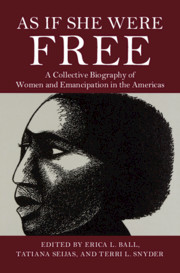Book contents
- As If She Were Free
- As If She Were Free
- Copyright page
- Dedication
- Contents
- Figures
- Contributors
- Elizabeth Catlett and the Form of Emancipation
- Acknowledgments
- Introduction
- Part I Claiming Emancipation during the Rise of New World Slavery
- Part II Experiencing Freedom during Slavery’s Expansion
- Part III Envisaging Emancipation during Second Slavery
- 14 Bessy Chambers, Nineteenth-Century Jamaica
- 15 Minerva, Nineteenth-Century Téjas and Louisiana (US), and Mexico
- 16 Cécile Fatiman and Petra Carabalí, Late Eighteenth-Century Haiti and Mid-Nineteenth-Century Cuba
- 17 Mary Ellen Pleasant, Nineteenth-Century Massachusetts and California (US)
- 18 Gabriela, Nineteenth-Century Rio Grande do Sul (Brazil)
- 19 Maria Firmina dos Reis, Nineteenth-Century Maranhão (Brazil)
- Part IV Enacting Emancipation in the Aftermath of Slavery
- Bibliography
- Index
19 - Maria Firmina dos Reis, Nineteenth-Century Maranhão (Brazil)
from Part III - Envisaging Emancipation during Second Slavery
Published online by Cambridge University Press: 24 September 2020
- As If She Were Free
- As If She Were Free
- Copyright page
- Dedication
- Contents
- Figures
- Contributors
- Elizabeth Catlett and the Form of Emancipation
- Acknowledgments
- Introduction
- Part I Claiming Emancipation during the Rise of New World Slavery
- Part II Experiencing Freedom during Slavery’s Expansion
- Part III Envisaging Emancipation during Second Slavery
- 14 Bessy Chambers, Nineteenth-Century Jamaica
- 15 Minerva, Nineteenth-Century Téjas and Louisiana (US), and Mexico
- 16 Cécile Fatiman and Petra Carabalí, Late Eighteenth-Century Haiti and Mid-Nineteenth-Century Cuba
- 17 Mary Ellen Pleasant, Nineteenth-Century Massachusetts and California (US)
- 18 Gabriela, Nineteenth-Century Rio Grande do Sul (Brazil)
- 19 Maria Firmina dos Reis, Nineteenth-Century Maranhão (Brazil)
- Part IV Enacting Emancipation in the Aftermath of Slavery
- Bibliography
- Index
Summary
Maria Firmina dos Reis was born in São Luiz do Maranhão, a remote northern province of the Brazilian Empire, probably in 1825. The daughter of a black father and a white mother, and a self-taught woman who had never received formal education, Maria Firmina became the youngest elementary teacher in a newly founded local school. In 1859, she published the novel Ursula and became the first black woman to publish a literary text in Brazil. Ursula not only offers harsh criticism of slavery and the slave-owning patriarchal family, but also gives narrative voice to enslaved characters and their reflections on life under captivity. Forgotten for more than a century, her work started to gain recognition in the 1970s. Nowadays revered as a pioneering black novelist, she is, along with Luiz Gama - former slave, also a self-taught man who became a lawyer, poet and anti-slavery militant - the founder of Afro-Brazilian literature.
- Type
- Chapter
- Information
- As If She Were FreeA Collective Biography of Women and Emancipation in the Americas, pp. 344 - 356Publisher: Cambridge University PressPrint publication year: 2020

